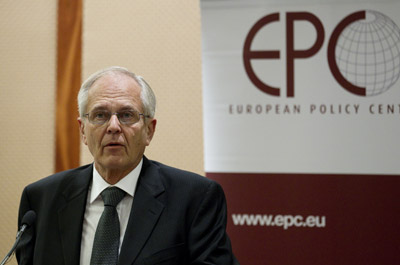Hans Martens on the Future of the European Economy

(Hans Martens is Chief Executive European Policy Centre)
Q: European Policy Center is an influential think-tank. Tell us more about it. How does it run its research work?
A: EPC is not only influential, it is also independent. Our credibility comes primarily from the fact that we are not associated with any political party, with government institutions or with business or NGO’s. EPC has a membership that reaches across all of these stakeholder groups, and as we have around 400 member organisations – from government, foundations, business, NGO’s, regional bodies and more, nobody “owns” EPC, and we are doing all we can to bring in all the important stakeholders in our debates, which are often directly with participation of top decision-makers from EU institutions and from national governments. Our research work also often involves the members – the stakeholders – for example in projects and in task forces where we are trying to find policy answers to the big questions around us. We are very much for open public debates, and we arrange some 180 small and large events per year.
Q: We have heard different views about the future of European economy. Will it stagnate for the foreseeable future or it will rebound back soon?
A: The European economy will rebound back soon. The fears for the existence of the Euro has largely disappeared, and this combined with the fact that the Euro remained stable throughout the crises and the lowering of interest rates we have seen gives a foundation to work on. There are still very large differences in economic performance and competitiveness between largely north and south in Europe, but the fact that the economy has been so much in recession means that some progress will be made, even if it will be small steps.
On the longer term there are many challenges, which includes the problems with demographic developments which will change the relationship between those that pay into the European welfare system and those that take out, for example health and care services and pensions. Reforms are needed in a number of areas, but Europeans are not keen to give up on what has been achieved in relation to social benefits broadly.
Q: What are the most important factors that will stimulate the European economy or hinder its growth?
A: Europe must take global competition more seriously and not only complain about it but also reform itself to become more competitive. A stable Euro certainly makes the European economy more competitive, but the risk is that it becomes too strong, which is not what Europe really needs now. The biggest problem for reforms is actually the resistance in the European populations when it comes to change, not least in areas as pension age and provision of welfare services. Also Europe’s public sectors needs reform, but again this often is a very difficult thing to do politically.
Q: Let's predict the future. Do you believe that the EU will fully realize the 2020 strategy? If not, why?
A: I don’t think anybody actually takes the plan too literally, but we will move in the direction of a more smart, socially balanced sustainable growth, because it is recognised that further digitalisation is necessary, because a lot of things done are automatically going in the direction of greening the economies, and because the social balance issue is so strongly embedded into the European political systems. So yes, we will get in that direction, but don’t see 2020 as a plan that will be followed strictly.
Q: When will the debt crisis be resolved? Is the worst moment over?
A: The worst is over because the “hysteria” around the Euro and the debate as such as gone away, mostly because of the new role of the European Central Bank. But the debt will not go away just because of this or because of austerity. The debt can only be reduced if there is a combination of fiscal prudence and economic growth, and whether or not Europe is really back on a growth path depends on a number of things, including the global economic developments, and it is too early to say for sure that we are going in that direction.
Q: Why is there a "two-speed' Europe? What is its basic meaning? Is it harmful to European integration?
A: We already have a two speed Europe, as for example many countries are outside of the common currency, and other, in particular UK and Denmark, has some exceptions for important EU policies. We are living with that, and in the future we may see more countries going ahead as an Avant Garde in some areas without everybody joining in – at least from the outset. A more important effect could be if UK decides to reduce its involvement with the European Union, but that will be a longer process that may create problems along the way, but not something that will destroy the European Union.
Q: Will the UK say good-bye to the EU?
A: Perhaps it will happen over time, and at the same time there might be splits in the UK, so we may in the future say good bye to England, but welcome back to Scotland.
Q: Finally, as a senior scholar, what would you like to say to the young scholars in China? How can they be more competent?
A: It is important for young scholars today that they have an open mind about the world, that they try to earn the most important languages in the World, and that they concentrate on learning on how to learn, on to research, and how to get information rather than trying to learn a lot of facts by heart. The facts are all around us, and can easily be found and analysed – of you understand how to do it.
- Back _articles: Prof. Thomas Christiansen on China-EU Relations
- Next _articles: An Interview with Daniel Gros